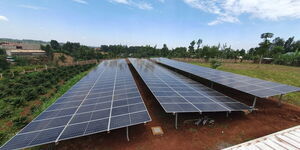The government, through National Oil Corporation (NOC) on Tuesday, May 2, announced that Kenyans would enjoy lower fuel prices due to local exploration.
NOC Chairman, Kiraitu Murungi, made the announcement after he took over the reins of the corporation from Patrick Obath.
Apart from producing its oil, Kiraitu Murungi further revealed that Kenya was set to join the Organisation of the Petroleum Exporting Countries (OPEC) and other oil-producing nations.
“You need to produce your oil because it is what you can control,” Kiraitu outlined measures President William Ruto-led government would institute to cushion Kenyans from fluctuating global pump prices.
On why the country needed to start drilling its oil, the newly appointed NOC chairman revealed that external pressures were affecting fuel prices. This included dollar volatility and global conflicts that always affected energy security in Kenya.
“NOC was established for energy security. NOC still has that relevance. We also have a rich mandate in the upstream sector – exploration and production," Murungi added.
The country will know if it will join the League of oil exporters in June 2023 after a review of its oil reserves. The Energy and Petroleum Regulatory Authority (EPRA), which reviews commercialising oil in the South Lokichar Basin, will table its finding in June 2023.
It is estimated that the Basin has an oil reserve of up to 450 million barrels. The government of Kenya currently has 22.5 per cent of the oil share in the Lokichar Basin, which is located in Turkana.
According to Statista, Kenya imports an average of 3000 barrels daily, and the 450 million locally produced barrels would greatly boost the nation’s economy.
The country has seen stabilised oil prices in the year 2023 despite Ruto removing fuel subsidies that were put in place by his predecessor Uhuru Kenyatta. Ruto revealed that the stability of oil prices was due to his administration’s decision to buy fuel in local currency instead of the dollar.
“I want to assure those in Kenya who were facing challenges of access to dollars that we have taken steps to ensure dollar availability in the next couple of weeks, things are going to be different because our fuel companies will now be paying for fuel in Kenya shillings,” the President stated on Wednesday, March 22.
According to the EPRA fuel review for April 2023, In Nairobi, fuel was retailing at Ksh179.30 for super petrol, Ksh162.00 for diesel, and ksh145.94 for kerosene per litre. In Mombasa, fuel retailed at Ksh176.98 for Super Petrol, Ksh159.76 for diesel, and Ksh143.69 for Kerosene per litre.
Tullow Oil and Kenya Selling Its First Oil
Meanwhile, oil exploration in Kenya began in 2019, with Tullow Oil, a British multinational oil and gas exploration company, issued with the licence. Tullow was tasked with producing 100,000 barrels per day.
That same year, President Uhuru Kenyatta (Retired) announced Kenya's official entrance into the oil export market, earning nearly Ksh1.2 billion from selling 22,000 barrels of crude oil.
Nonetheless, Tullow, which expected the first crude shipments from its Kenyan oilfields in 2019, faced challenges with constructing an oil processing facility and an 890-kilometre crude oil pipeline from Lokichar to Lamu. Tullow underlined government setbacks in securing water rights and acquiring land for pipeline developments.
In 2022, the British firm announced plans to submit a new field development plan (FDP) beyond the end of the 2021/2022 financial year. The FDP included seeking land to develop a pipeline and oil processing facility and compensation of 516 landowners in Turkana County.
Tullow's exploration of oil in Uganda also suffered setbacks after its contract for the construction of the 1,445-km East African Oil Pipeline, was terminated in a tax dispute with the Ugandan government.












